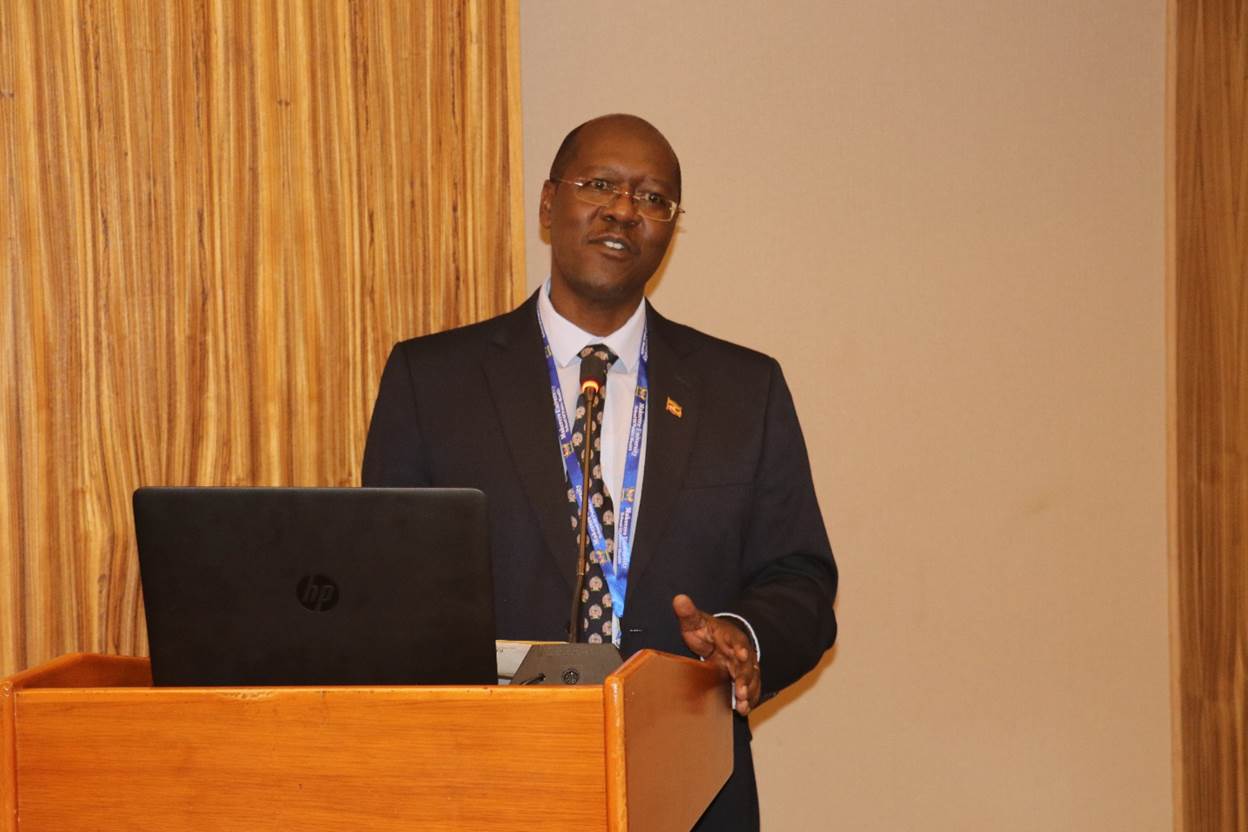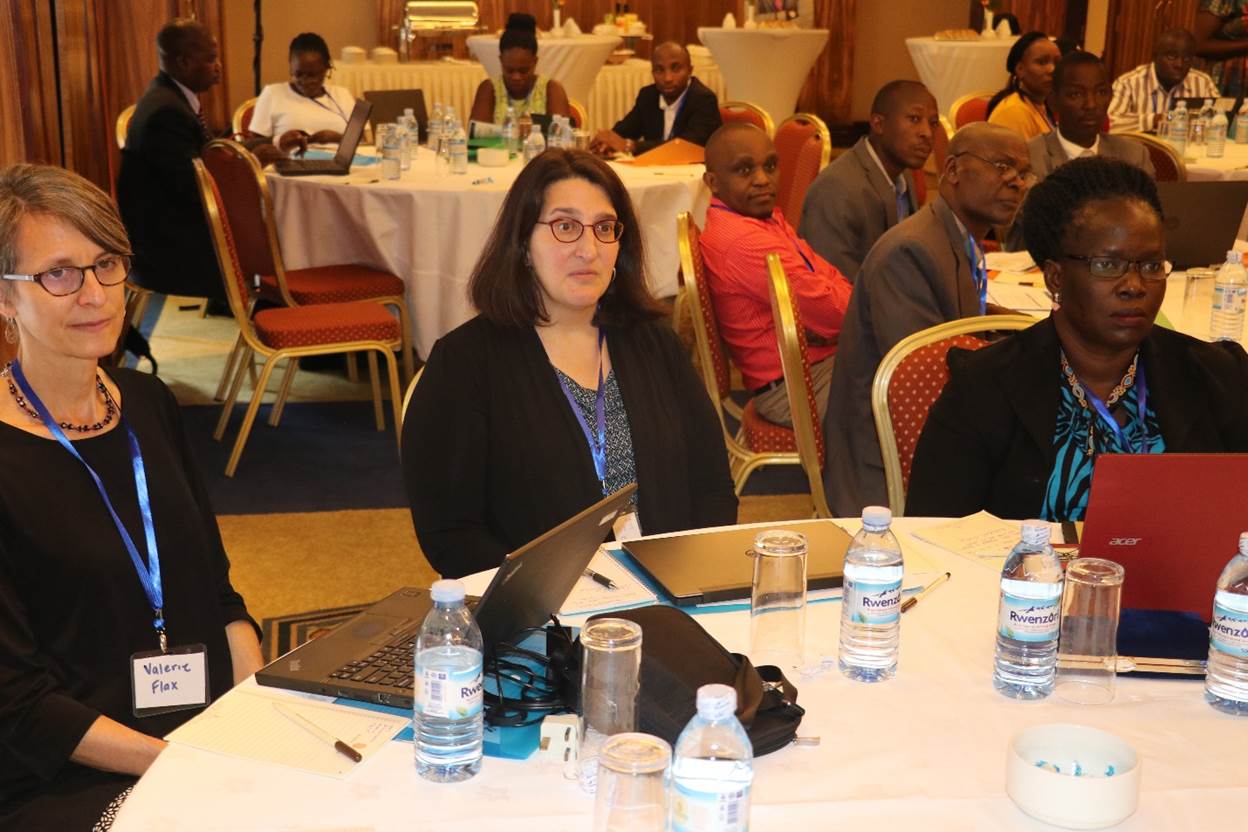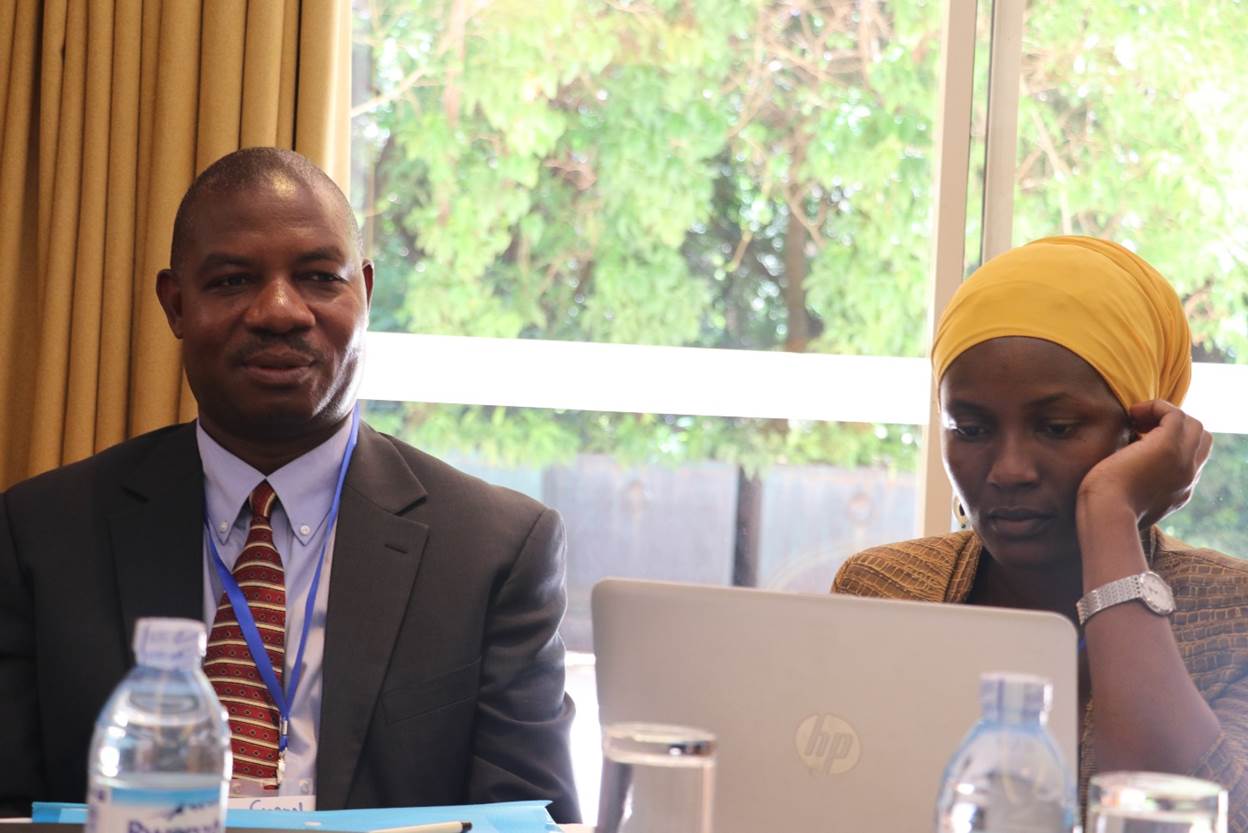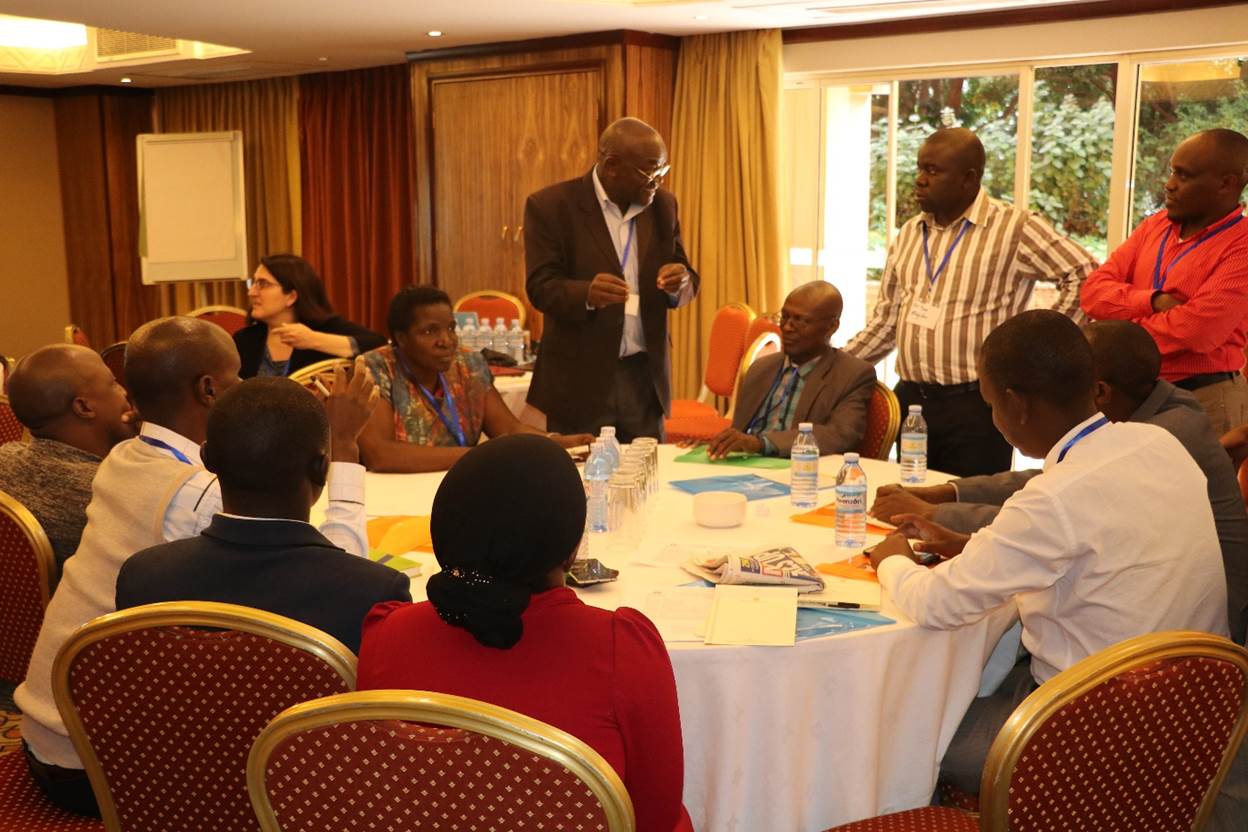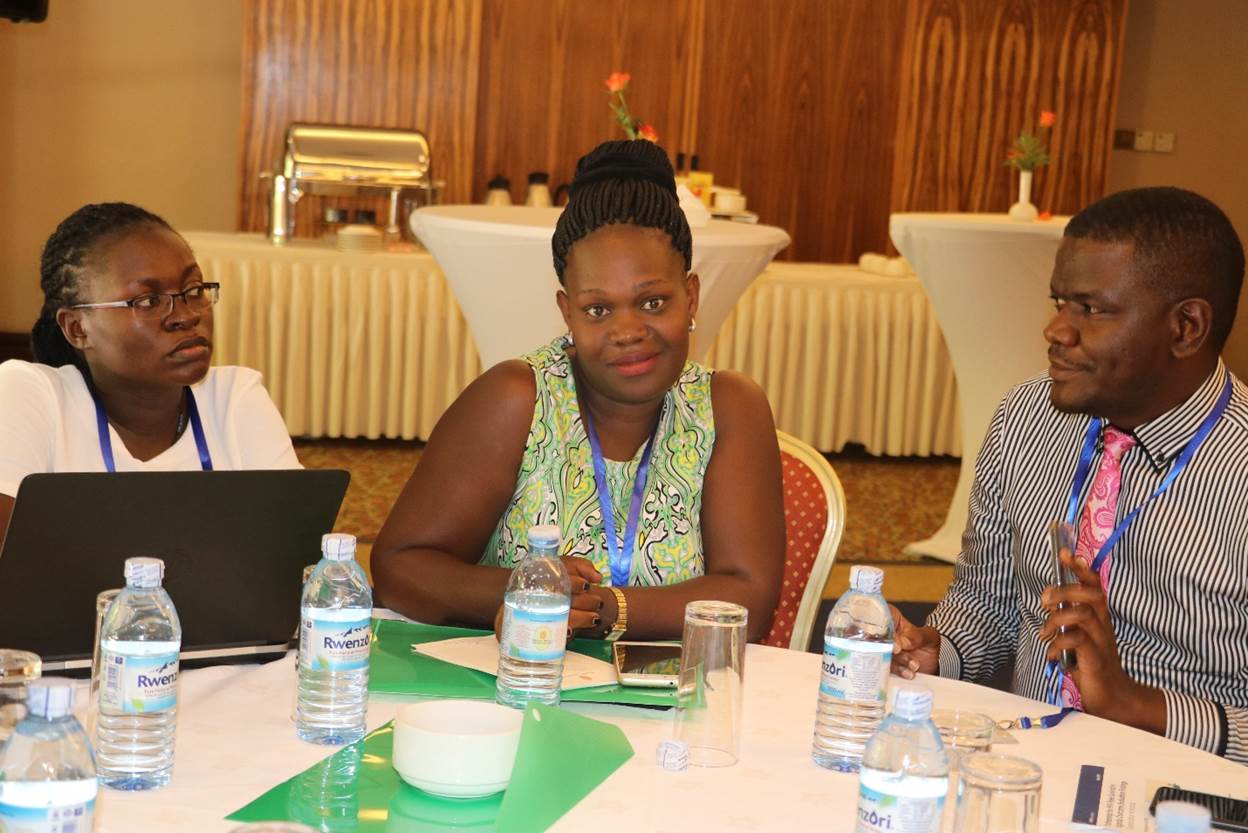
(Steven Ssendagire, one of the study coordinators of the PHFS Evaluation study from MakSPH having a discussion with other participants at the dissemination workshop.)
On 30th May 2019, a team of researchers from Makerere University School of Public Health (MakSPH) urged policymakers and organizations to adopt the PHFS (Partnership for HIV-Free Survival) approach. Together with MEASURE Evaluation, the researchers arrived at this conclusion after conducting an outcome evaluation of PHFS in Uganda.
Speaking at the PHFS Dissemination Workshop at Kampala Serena Hotel, Prof. Lynn Atuyambe, one of the lead researchers from MakSPH said the programme enhanced retention for of mothers and children into free HIV care.
One of the innovations that were adopted by the programme that led to its success according to the evaluation done was the mother-baby pairing model. In this model, the appointment of an HIV positive mother and that of her baby were synchronized to one day. Previously, they would be seen differently and most of the times, on different days.
Speaking about the benefits of the mother-baby pairing, a respondent from Namutumba who worked on the Quality Improvement (QI) aspect of PHFS said, “With integration, the waiting time reduced and someone would get all services under one roof and almost, at the same desk.”
‘The friendly nature of PHFS mentorship also made it easy for the participants to take responsibility. This enhances teamwork and collaboration for a national cause in line with HIV-Free survival projects implementation, Prof. Atuyambe explained during the workshop.
Brief background about PHFS
The PHFS Initiative was designed to reduce mother-to-child transmission of HIV and increase child survival, through improvements in breast feeding practices, antiretroviral therapy uptake, and coverage among HIV-positive pregnant women and mothers, and overall mother-baby care.
PHFS was implemented in the six districts of Jinja, Manafwa, Tororo, Kisoro and Ntungamo from 2013-2016. It was implemented in 22 demonstration sites and it was scaled up in 56 scale-up sites. The programme used a quality improvement approach that included facility-level or department-level assessments of elimination of mother-to-child HIV transmission (eMTCT) services and outcomes, QI training for staff, on-site technical assistance, routine data collection and reporting, information sharing, and follow-up support.
Prof. Atuyambe explained that the evaluation of PHFS was done in 12 districts; in the 6 districts where the programme was undertaken and in six neighboring districts where it was not undertaken in order to get a comparison of its impact. The six neighnouring non-PHFS districts included Mbale, Iganga, Kamuli, Mbarara, Kabale and Bushenyi. A number of indicators were tracked and these included exclusive breastfeeding, 12-month retention into care, 18-month retention, feeding completeness and 18-month HIV test completeness.
The project team also had two other Principal Investigators from MakSPH in Prof. Freddie Ssengooba and Dr. Simon Kasasa. It was coordinated by Dr. Susan Babirye and Steven Ssendagire, both from MakSPH as well. This team collected data from health facilities using their records, did interviews with district coaches and with quality improvement (QI) teams.
Findings
While sharing findings at the PHSF workshop, Prof Valerie Flax noted that PHFS increased exclusive breast feeding and a 12-month retention in care during the intervention period. Prof. Flax is a Senior Research Public Health Analyst with RTI international.
In addition, the percentage of children with positive HIV tests at 18months declined during PHFS, but not significantly. Data completeness also increased for 18month HIV test results but decreased for child feeding data recorded during first visit.
Sustainability of PHFS was equally good across all indicators in the demonstration sites but was more mixed in the scale-up sites, most likely because the scale up intervention period was short, and activities may not have been fully established by the time support ended said Prof Flax, a Senior Research Public Health Analyst.
In Uganda, PHFS was implemented in 22 Demonstration sites and 56 scale-up sites in six districts (Jinja, Manafwa, Namutumba, Tororo,Kisoro ,and Ntungamo) in collaboration with Makerere School of Public and Measure Evaluation.
In her Presentation, Dr. Susan Babirye said, “to enable sustainability of the project, innovations (tested changes) were made during the PHFS implementation like mother follow up, new staff orientation and mobilization of funds to address project gaps.” She also mentioned that capacity building and retention of workers were key factors in sustainability of the project’s countrywide evaluation of PHFS. These innovations greatly contributed to the success of the programme.
The project coordinator also mentioned several issues that were a challenge in the PHFS study. These barriers include; the transfer of trained health workers working with the programme who are replaced (or not replaced) with those that have no idea about the programme and thereby require fresh training; the fading interest of leaders and implementers in fighting HIV/Aids; and insufficient funding to roll out programmes targeting the reduction of HIV.
More about the PHFS Project
PHFS used a quality improvement (QI) approach that included facility-level or department-level assessments of elimination of mother-to-child HIV transmission (eMTCT) services and outcomes. QI training for staff, on-site technical assistance, routine data collection and reporting, information sharing and follow-up support.
The programme was implemented as a collaboration between United States President Emergency Plan For AIDs ,UNICEF and ,the World Health Organisation (WHO) to accelerate the uptake of WHO 2010 guidelines on HIV and infant feeding in Kenya, Lesotho, Mozambique, South Africa, Tanzania, and Uganda.
In Uganda, key partners in the implementation of PHFS included University Research, Co.’s Applying Research to Strengthen and Improve Systems (ASSIST) Project, FHI 3600 s Food and Nutrition Technical Assistance (FANTA) project, the Elizabeth Glaser Paediatric AIDS Foundation (EGPAF), JSI’s Strengthening Partnerships, Results, and Innovations in Nutrition Globally (SPRING) program, The Aids Support Organisation (TASO), the Uganda Ministry of Health, and the United States Agency for International Development (USAID). The launch of PHFS activities coincided with the rollout of the Option B+ approach to prevention of mother-to-child transmission (PMTCT) in Uganda.
This article was written by Joseph Odoi and edited by Agnes Namaganda


